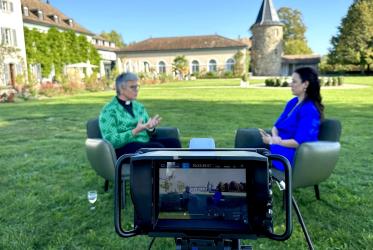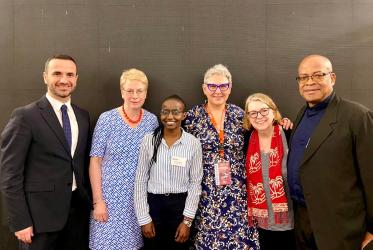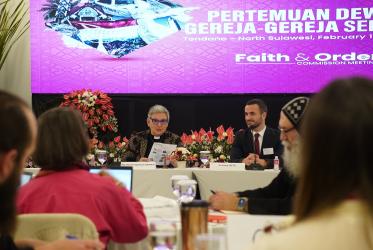Greetings
by Ahn Jae Woong, general secretary of the Christian Conference of Asia
Moderator Rev. Dr David Yemba, general secretary Rev. Dr Samuel Kobia, Members and staff of the Faith and Order Commission, honourable guests, sisters and brothers in Christ,
In the name of our gracious God and on behalf of the Christian Conference of Asia, I extend to you all a warm welcome to Asia, the cradle of world civilizations and major religions, and home to more than half the world’s population.
I extend a heartfelt welcome to you all to this predominantly Muslim country of Malaysia. I welcome you to Kuala Lumpur, where we will spend the next few days finding ways to promote visible unity of the Christian church in a non-Christian milieu.
I sincerely hope that the Faith and Order Plenary Commission Meeting will bear good fruits.
Asian realities
Masao Takenaka, in a publication brought out in connection with the 5th General Assembly of the WCC held in Nairobi in 1975, described as having three kinds of “Easts.”
First is the geographical East; namely, Asian Christians who have been living as a minority group among the people of other faiths. The second is the political East; that is, those Christians who have been living in the socialist countries where dialogue with the people of Marxist ideology is a constant concern. Thirdly, we count the ecclesiastical East; those Christians who have the traditions of the Eastern and Oriental Orthodox Church. Despite the differences among them they have common characteristics; namely they take a positive attitude towards open dialogue and joint collaboration with the people of other faiths and ideologies. At the present time, they still live at a distance both geographically and culturally, but through closer relationship and mutual stimulation with nature and people around them, they may contribute a unique theological understanding different to that of the West.
We are here in the midst of three Easts, even though the global geopolitics has changed drastically. East and west cold war ideologies no longer exist. The USA is now the only super power, which dominates the geo-politics. Religious fundamentalism is being used as source for terrorist acts.
Therefore, it is time for us to redefine ecumenical movement beyond the context of East and West, and articulate ecumenical movement in the context of the USA now being the sole superpower.
I am sure that the Faith and Order plenary would come out with new ways of working for the ecumenical movement in the context of global changes.
Let me characterise Asia based on different views of the people.
The abject poverty due to over-population, gap between rich and the poor, unjust socio-political systems and lack of ownership of movable and immovable property are common in Asia. This is a trend, which will continue for a long period of time.
Asians are living in diverse conditions in terms of race, colour, languages, religion, political systems, culture and social status. Diversity often generates conflicts among themselves.
Many Asian people suffer due to birth, ethnicity, locality and low socio-economic status. The cry of the people for their dignity is a constant reality in Asia today.
Major religions of the world are still dominating people’s minds and hearts in Asia. Religious teachings and values are deeply rooted in Asian peoples. Many Asians live and practice faith in uncertain situations.
Many Asian peoples are facing security of their lives due to nuclear threats, border conflicts, new forms of diseases, unemployment or underemployment, negative effects of globalisation and war on terrorism and environmental degradation.
Degradation of environment is a serious threat for the people of Asia. Development syndrome has led to the devastation of mother earth and the ecology. As a result, seeking for alternative ways of sustaining humanity together with God’s creation is the immediate task for all of us.
After all, people in Asia, like people anywhere in the world, aspire for good and quality life. Life is valuable and precious not only for an individual but also for the whole of God’s creation. Religious teachings and Christian life, therefore, become relevant for achieving people’s aspirations. The work of the Faith and Order has a special role to play in liberating people’s captivities of thinking, writing, speaking and performing core values. The Faith and Order movement should offer new ways of theological framework for fullness of life for all God’s people and building communities of peace for all. Today, we have gathered here to seek God’s wisdom for our common vision and mission of fulfilling this ecumenical task.
Asian churches
We, Asian Christians, believe that Christian churches were set up in India as far back as 54 AD. They flourished in 182 AD. In many places in the region, Christian missionaries introduced Christianity. Asian churches have cooperated with western colonial powers or authoritarian governments for some time. But, in many places, Asian churches have been deeply associated with independent and democratic movements in different countries. As a result, Asian churches have a moral authority in nation building and democratisation. Moreover, many Asian theologians have tried to articulate their contextual theologies, such as Minjung theology in Korea, Homeland theology in Taiwan, People’s struggle theology in the Philippines, Water Buffalo theology in Thailand, Dalit theology in India, Buraku liberation theology in Japan and so on.
At the same time, Asian churches have also demonstrated church unity, like the Church of South India, Church of North India and Church of Christ in Thailand. In a different way, perhaps, the United Church of Christ in Japan and the United Church of Christ in the Philippines have demonstrated church unity mainly because of external pressures. China Christian Council is an expression of the post-denominational church and the Uniting Church in Australia has an inclusive and open policy when appropriate time comes to new churches joining it.
Asian churches as a whole may be able to contribute to the rest of the world the experiences of the churches of the united, uniting and post-denominational within the framework of the Faith and Order Commission of the WCC, for further exploration.
Ecumenical tasks
We have to seek the true meaning of ecumenism in the context of non-Christian or non-ecumenical realities in our world today. Ecumenical movement should recapture frontier spirit in exploring God’s plans in the whole of God’s creation where people and environment mutually suffer due to no faith in God or disorder caused by by human desires.
One of the weaknesses of the ecumenical movement is that it is moving away from the people or people’s movement. In order to revitalise people centred ecumenism, as I have suggested at the CCA executive committee meeting held in June in Chiang Mai, Thailand, let me reiterate that the Asian churches and all peace-loving people should work towards the goal of an Asian people’s Pax Asiana. In doing so, people-initiated peace making and people-oriented peace building eventually should achieve Asian People’s Pax Asiana. Asia has rich tradition of respect for life and the search for a communitarian and egalitarian way of life. We have to gather all Asian people’s wisdom, traditions, customs, experiences for building a People’s Pax Asiana, which is an ecumenical task in our times.
Perhaps, the Buddhist way of the Sangha could be an option for building people’s Pax Asiana. The Sangha is understood as a spiritual community where all members shared their understanding of life and stability of community, shared their sorrows and joys and all were connected with each other. The Buddhist way of Sangha could be an ideal stage of people’s Pax Asiana in the future.
In fact, people’s struggle against racism, classism, sexism, militarism and all kinds of discrimination and domination should be the constant ecumenical tasks of all peace-loving people for building peace in our midst.
Peace is not only the absence of war or conflicts, but also shalom, righteousness or wholeness, security and liberation or salvation. The awareness of violence, non-violence and the struggle of justpeace are the ultimate biblical teachings for generation after generation. In fact, without resolving the tension; hatred and hostilities in human hearts and minds, any attempt for peace making efforts will be futile.
Therefore, we have to work together with people of other faiths and no-faiths, as well as civil society groups in order to achieve peace with justice in every sphere of our lives.
In the Beatitudes (Mathew 5:3-11), Jesus teaches us, “Blessed are the peacemakers, for they will be called Children of God.”
We are called to be peacemakers. Today, more than ever before, peace making is God’s ordained ecumenical task.
All we ought to do is that of Metanoia, because:
We are unable to properly articulate theological framework
We are unable to live as good neighbours
We are unable to deliver good news to the poor
We are unable to work together as partners
What we have to do is to go through Metanoia for becoming New beings, as children of God, so as to be peacemakers in our times. May God bless us all,
Thank you.



